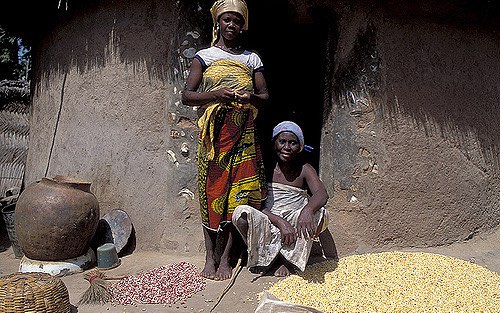Ghana’s steady economic growth since the 1980s has helped reduce poverty and improve food security and is considered one of the development success stories of Africa south of the Sahara. Ghana’s agricultural transformation—improvements in farming technology, value chains, crop diversity, and other changes—has been key to that growth. Less clear, however, is how this transformation has contributed to better nutrition and food security.
Recent research by IFPRI’s Olivier Ecker examines the linkages between farm production diversity and household dietary diversity in rural Ghana and how those relationships changed through the period of agricultural transformation between 2005 and 2013.
Using household data from the Ghana Living Standards Surveys, household dietary diversity was measured using counts of the different food items and different food groups consumed. Farm production diversity was measured by a simple count of different crop groups cultivated and by Simpson’s diversity index, which accounts for evenness of land allocation to different crop groups.
Analysis of the data shows that farm production diversity and household income growth are strongly associated with dietary diversity. Harvesting one additional crop group increases the number of consumed food groups by a factor of 0.111 and raising the Simpson diversity index by 10 percentage points increases the number of consumed food groups by 0.031.
Meanwhile, economic growth and urbanization in Ghana are shifting the agriculture sector towards commercial farming that emphasizes increased outputs and undermines farm diversity. While the average annual crop yield per hectare increased by 4.3 percent annually between 2005 and 2013, farm households’ food self-sufficiency levels decreased from 48 percent to 46 percent. This phenomenon is a result of commercialization, in which farm households often specialize in the production of a few profitable crops or livestock, thus reducing on-farm production diversity. Farmers who sacrifice diversity of foods in this manner may experience lower dietary diversity if specialization is not buoyed by market purchases—a challenge for rural farmers living in remote areas where production decisions might heavily impact household consumption decisions.
But the also research demonstrates that farm production diversity and profitability do not have to be opposing goals. Agricultural production activities like poultry ownership and the cultivation of roots, tubers, plantains, fruit crops, and legumes are positively associated with increased dietary diversity and receive higher selling prices than alternative crops. More diverse intercropping patterns also contribute to higher yields and income while improving soil fertility and pest management.
As Ghana continues its economic expansion and development, substantial urban-rural differences in people’s living conditions, economic activities, food-sourcing, and diets are giving rise to a double burden of nutrition in which undernutrition and overnutrition are becoming simultaneous challenges. Reductions in stunting and hunger are now coupled with new nutritional challenges, including overweight, obesity, and non-communicable diseases that increase private and public healthcare costs and decrease productivity.
Although commercialization may create challenges, it is pertinent to connect urban-rural links for economic and labor productivity growth in the agriculture sector. Given that farmers tend to prioritize satisfying their families’ food requirements over maximizing profits, agricultural commercialization can be expected to progress at a slow pace under the status quo.
To sustain such growth while also addressing the double burden of nutrition in Ghana, researchers recommend that policymakers and civil institutions identify investments in a number of areas: Agricultural market infrastructure, technology, knowledge transfer, implementation of regulations, and economic stimulus programs for farmers and processors. These should focus on improving the current agricultural value chain and creating opportunities and innovations that improve productivity of food production and security. Dietary diversity is a potential bulwark against the double burden of malnutrition. Interventions must carefully consider the tradeoffs and potential adverse outcomes, so we avoid prioritizing economic gains at the cost of farm diversity and therefore better nutrition.
Maxwell Young is an IFPRI Communications Specialist. This research was funded by the United States Agency for International Development (USAID) and the CGIAR Research Program on Policies, Institutions, and Markets (PIM).







